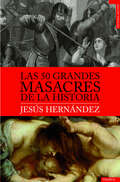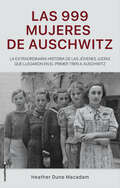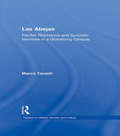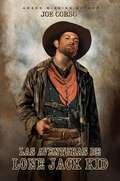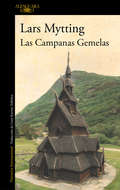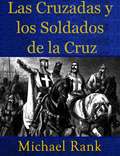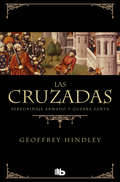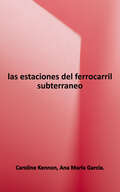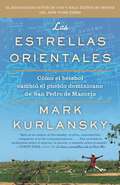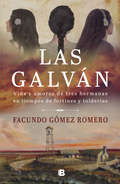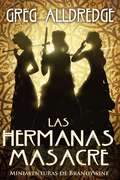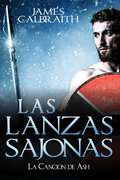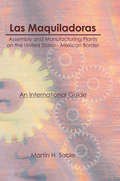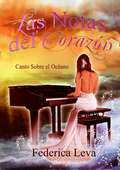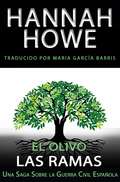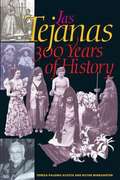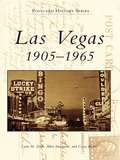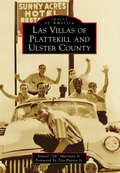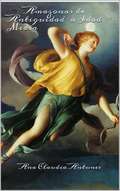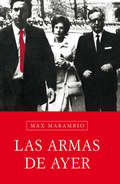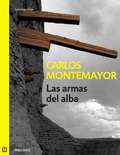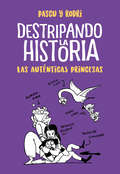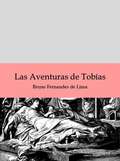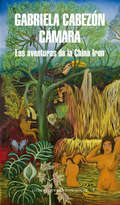- Table View
- List View
Las 50 grandes masacres de la historia
by Jesús HernándezA través de los cincuenta hechos históricos que aquí se relatan, el lector tendrá ante sí un aciago panorama de lo que ha significado la masacre a lo largo de la historia. El asesinato masivo de personas inocentes ha sido, desgraciadamente, una constante en la historia de la Humanidad, desde el exterminio de los habitantes de Jericó en el 1.500 a.C. hasta los grandes atentados terroristas del siglo XXI, pasando por la aniquilación de los cátaros en 1209, la Matanza de San Bartolomé en 1572, la masacre de Wounded Knee en 1890, el Bloody Sunday de 1972 o el aplastamiento de la revuelta de 1989 en la plaza de Tiananmen. A través de los cincuenta hechos históricos que aquí se relatan, el lector tendrá ante sí un aciago panorama de lo que ha significado la masacre a lo largo de la historia. Y podrán llegar a una conclusión tan inesperada como inquietante; sólo una minoría de los perpetradores de esas carnicerías pagarían por sus crímenes y, además, muchos de ellos alcanzarÌan el reconocimiento público y los máximos honores, incluido el Premio Nobel de la Paz.
Las 999 mujeres de Auschwitz: La extraordinaria historia de las jóvenes judías que llegaron en el primer tren
by Heather Dune MacadamUna increíble historia de amistad, sororidad y supervivencia. La historia de las primeras 999 mujeres judías que fueron enviadas al campo de exterminio. «Todo comenzó con las chicas», dice Giora Amir, de 91 años. El 25 de marzo de 1942, cientos de jóvenes mujeres judías y solteras abandonaron sus hogares para subir a un tren. Estaban impecablemente vestidas y peinadas, y arrastraban sus maletas llenas de ropa tejida a mano y comida casera. La mayoría de estas mujeres y niñas nunca habían pasado ni una noche fuera de casa, pero se habían ofrecido voluntariamente para trabajar durante tres meses en época de guerra. ¿Tres meses de trabajo? No podía ser algo tan malo. Ninguno de sus padres habría adivinado que el gobierno acababa de vender a sus hijas a los nazis para trabajar como esclavas. Ninguno sabía que estaban destinadas a Auschwitz. Los libros de historia han podido pasar por alto este hecho, pero lo cierto es que el primer grupo de judíos deportados a Auschwitz para trabajar como esclavos no incluía a combatientes de la resistencia, ni a prisioneros de guerra, no. No había ni un solo hombre prisionero en esos vagones de ganado. Era un tren de 999 chicas solteras, vendido a la Alemania nazi por una dote de 500 Reich Marks, el equivalente a 200 euros. Sabemos que la historia está escrita por el vencedor. Casi todas las figuras poderosas en ambos lados de este conflicto eran hombres. Estas 999 mujeres jóvenes fueron consideradas indignas e insignificantes, no sólo porque eran judías, sino también porque eran mujeres. Estas chicas eran peones en un gran plan de destrucción humana, pero frustraron ese plan al sobrevivir y dejar su testimonio a sus familiares. Este libro da voz a esas mujeres y niñas que la historia olvidó. La crítica ha dicho...«La historia olvidada de las jóvenes judías que llegaron al campo en el primer tren, allá por marzo de 1942.»El País «Un relato conmovedor que ofrece las claves precisas para entender todo el horror –y toda la solidaridad entre sus víctimas– que encierra la barbarie.»La Vanguardia «Heather Dune Macadam cuenta las historias que ha logrado reunir, 75 años después, de aquellas chicas judías que llegaron en el primer tren a Auschwitz.»El Mundo «Una historia que, según la autora, ha sido "escondida o pasada por alto" cuando, en realidad, "estuvieron allí más tiempo que cualquier hombre judío".»20 minutos «Macadam nos cuenta lo que los libros de historia nunca nos han contado.»The Objective«Un texto difícil pero necesario para que esas historias no se pierdan y esas mujeres sean recordadas como se merecen.»Ataques de pánico «Es un libro extremadamente duro, pero necesario.»Lectora lila «Una lectura dolorosa pero muy interesante que recomiendo a todos aquellos que les interese esta temática o suceso en particular.»Leer es viajar «Es un libro tan impresionante como necesario, porque todo lo que se escriba sobre aquel horror siempre será insuficiente, tanto como memoria histórica como de advertencia para el futuro, pero que en este caso además cuenta con una excepcional habilidad y calidad narrativa.»Anika entre libros
Las Abejas: Pacifist Resistance and Syncretic Identities in a Globalizing Chiapas (Religion in History, Society and Culture #Vol. 1)
by Marco TavantiLas Abejas came to be known by the international community as the civil counterpart to the neozapatista movements and as a Christian pacifist movement. This book presents the voices of Las Abejas and of numerous collaborators alongside an innovative theoretical analysis of the dynamics of identity construction. The uniqueness of this study is the analysis of the role of international human rights observers in relation to indigenous communities in resistance. In this fascinating study, Marco Tavanti explains how cultural, religious, political, human rights and nonviolent frameworks combine in a syncretic identity of resistance.
Las Aventuras del Chico de Lone Jack
by Joe CorsoÚnete a la diversión. Cabalga junto a Jesse y Frank James y los hermanos Younger mientras comparten las aventuras de The Lone Jack Kid. Era tiempo de guerra y los hombres vivían y morían luchando contra sus enemigos... y a veces morían luchando entre ellos. Cole miró a los hombres, levantó la mano y dijo con una voz lo suficientemente fuerte como para que todos en la sala la oyeran: "No lo hagan, muchachos. Sturman era un canalla amarillo, y un desertor, y no tienes que morir tratando de vengar a gente como él. Había siete indios y estaban parados alrededor de dos mujeres blancas semidesnudas que parecían ser madre e hija. Charlie respiró hondo y lo dejó salir lentamente. Luego apuntó - - y disparó, y disparó, y disparó, y disparó de nuevo, repetidamente. Dejó caer a cuatro de los indios antes de que supieran qué los golpeó. Luego cargó en el claro y disparó a otro indio que intentaba alcanzar su arma. "Mi nombre es Charles Longstreet." Los hombres se miraron unos a otros como si se tratase de un reconocimiento. "¿Eres el chico solitario de Jack?" El Niño sonrió. "El único e inigualable". Se quitó el sombrero de la cabeza y lo agitó en el aire, luego dio el grito de Rebelde. "Nos vemos en el infierno, muchachos". Sacudió las riendas, y empujó a Cometa con sus curas. Giró la cabeza y saltó hacia el burbujeante arroyo con agua tan alta como los estribos, y salpicó con zarcillos de agua que salpicaban en el aire a ambos lados de ella. Fue una impresionante demostración de equitación, y los cobradores de peaje observaron con rencorosa admiración.
Las Campanas Gemelas
by Lars Mytting«El noruego Lars Mytting va camino de convertirse en una estrella internacional,al estilo de su paisano Karl Ove Knausgård.»Matías Néspolo, El Mundo Una novela histórica rompedora sobre cómo el pasado puede influir inesperadamente en el presente. El tañido de las Campanas Gemelas de Butangen atraviesa su pequeño valle desde hace siglos como una atronadora señal de peligro. Estas campanas fueron forjadas según un molde hecho en recuerdo de las siamesas Halfrid y Gunhild Hekne. Todo lo que rodea su misteriosa historia, su sonido y el recuerdo de las hermanas parece cargado de la ominosa predicción de lo que está por venir. Cuando en 1879 se instala en el pueblo un sacerdote recién graduado y a él le sigue el extraño enviado de una universidad alemana, la cual ha adquirido el conjunto de la iglesia, que va a ser desmontada, parece ser que,por fin, ese futuro llega a Butangen. Las Campanas Gemelas es una historia exuberante, casi palpable, sobre cómo las nuevas ideas se enfrentan a la memoria, la tradición y la leyenda y sobre el desgarrador deseo de entregarse a los tiempos modernos. La crítica ha dicho... «El noruego Lars Mytting va camino de convertirse en una estrella internacional, al estilo de su paisano Karl Ove Knausgård.»Matías Néspolo, El Mundo «Nos habla sobre unas campanas hermanas hechas de plata, pero uno bien podría pensar que de nuevo el material con el que Lars Mytting ha estado trabajando en su nueva novela es el oro».Arne Hugo Stølan, VG «Una magnífica novela histórica».Stein Roll, Adresseavisen «Las Campanas Hermanas es emocionante. Un libro que de verdad se devora».Cathrine Loraas Møystad, Østlendingen «Esta novela histórica de Lars Mytting te cautiva y te atrapa [...]. Gracias a su poderoso estilo narrativo, entrelazado con una historia y un preciso conocimiento sobre la carpintería, la pesca y las iglesias medievales, hay razones para creer que con esta novela volverá a llegar a muchísimos lectores».Marius Wulfsberg, Dagbladet
Las Cruzadas Y Los Soldados De La Cruz
by Michael Rank Sandra Cifuentes DowlingDescripción del libro: "Las Cruzadas y los Soldados de la Cruz" es un emocionante libro recién publicado del historiador súper ventas Michael Rank sobre aquella remota epopeya por la recuperación de Tierra Santa. En él se analizan la vida y época de 10 personajes relevantes durante una de las etapas históricas más interesantes jamás vividas, cubriendo el período entre los años 1095 y 1212. Ya sea Pedro el Ermitaño conduciendo un ejército de 100.000 campesinos hasta Tierra Santa sin más pertrecho que simples horcas o Balduino IV quien lideró personalmente a sus tropas contra Saladino a pesar de ser un leproso terminal, estas figuras legendarias se sintieron obligadas a abandonar sus vastos territorios para embarcarse en una peligrosa aventura contra un enemigo considerablemente superior. Estudiaremos las razones que llevaron a estos 10 personajes a efectuar tamaño sacrificio. Para algunos pudo tratarse de afán por alcanzar la gloria en el campo de batalla, como es el caso de Ricardo Corazón de León. Para otros, mera curiosidad, como Leonor de Aquitania, quien le añadió un garbo espectacular a la contienda viajando protegida por lanzas hasta Jerusalén y en compañía de 300 sirvientas ataviadas con armaduras meramente decorativas. Y para muchos se trató de simple convicción religiosa, como aquellos miles de niños cruzados que marcharon, según se cuenta, hasta la costa mediterránea en espera de que el mar se abriera ante sus ojos tal como el Mar Rojo lo había hecho ante Moisés. Cualquiera haya sido su motivación personal, estos 10 protagonistas de las Cruzadas demuestran que la voluntad de afrontar un viaje tremendamente peligroso hasta otro continente indica que su personalidad fue la precisa para el fascinante tiempo en que les correspondió vivir.
Las Cruzadas: Peregrinaje armado y Guerra Santa
by Geoffrey Hindley¿Qué es lo que arrastró a miles de seres de distinta condición social a emprender fatigosas campañas con el propósito de conquistar territorio musulmán? ¿Se trataba de una motivación meramente religiosa o respondía también al deseo de obtener recompensas materiales? ¿En qué medida tales incursiones convulsionaron la historia europea y enturbiaron la relación entre musulmanes y cristianos, despertando el resquemor de los primeros y espoleando la mala conciencia de los últimos? El historiador Geoffrey Hindley presenta un vívido cuadro de las cruzadas, con singulares datos de interés histórico y fascinantes retratos de las figuras más sobresalientes de esas batallas que, bajo el estandarte de la religión asolaron la Edad Media y sus ámbitos político, social y militar.
Las Estaciones Del Ferrocarril Subterráneo (La Historia Oculta (hidden History) Ser.)
by Caroline KennonThe Underground Railroad was the massive effort by slaves and free people to secretly bring thousands of blacks to freedom in the North during the 19th century. This thought-provoking book will capture readers' imaginations and fill them with awe for the brave "conductors" and "passengers" on the Railroad. They'll learn about the many safe havens, called "depots," that housed fugitives and the secret passages within them that hid slaves from their pursuers. Information about the American Civil War and the Fugitive Slave Act, biographies of figures vital to the Underground Railroad, and stunning photographs and artwork are included in this important work about a terrible time in American history.
Las Estrellas Orientales
by Mark Kurlansky"Este es un clásico de Kurlansky: erudito, impredecible, compasivo, y se lee compulsivamente. . . . Una reveladora meditación sobre el deporte, la nación, y también sobre el mundo". -Junot Díaz, autor de La breve y maravillosa vida de Oscar Wao "¿Qué tienen en común Rico Carty, Alfredo Griffin, Pedro Guerrero, George Bell, Julio Franco, Juan Samuel, Sammy Sosa, Alfonso Soriano, y Robinson Canó? Que todos proceden de San Pedro de Macorís, la pequeña ciudad azucarera en la República Dominicana. ¿Una coincidencia? Difícilmente". -National Public Radio Al final de la temporada de 2010, más de ochenta y seis jóvenes y hombres de la empobrecida ciudad de San Pedro de Macorís jugaban en las Grandes Ligas -lo que significa que uno de cada seis dominicanos de las Grandes Ligas vinieron de los mismos equipos locales de los ingenios azucareros, y acudieron en masa a los Estados Unidos en busca de oportunidades, de riqueza, y de una vida mejor. Pero este viaje es también una crónica del racismo en el béisbol, de la necesidad de cambiar las costumbres sociales del deporte en la República Dominicana y en los Estados Unidos, y de las historias personales de los hombres que han buscado escapar de la pobreza jugando béisbol. En Las Estrellas Orientales, Mark Kurlansky revela el amor de dos países por un deporte, y descubre unos significados más profundos sobre lugar y identidad, tenacidad y supervivencia, colonialismo y capitalismo, pero especialmente sobre el béisbol. .
Las Galván: Vida y amores de tres hermanas en tiempos de fortines y tolderías
by Facundo Gómez RomeroLucía Galván se casa con Cayupí, un indio Pampa que se convierte en su socio armando una pulpería de campaña. En tanto, Raquel Galván se casa con un capitán y debe hacerse valer en el fortín. Elena Galván, la menor, contrae matrimonio con un ingeniero francés contratado por Alsina para construir la zanja más larga del mundo en plena frontera Oeste de la Provincia de Buenos Aires. Las Galván nos lleva al territorio de la frontera sur con el indio -hacia mediados del siglo XIX-, una zona virgen, azotada por el vendaval del desierto, que apenas si asomaba en los mapas. Allí transcurre la vida de tres hermanas, rodeadas de férreos militares y gauchos vagabundos, indios "amigos" y de los otros, caciques legendarios y simples pulperos, ingenieros franceses y peones de la tierra: un mundo relatado desde siempre por... hombres. Facundo Gómez Romero reconstruye el pasado en clave de ficción y entrama parlamentos y malones indios, batallas famosas, el París de 1875 o la construcción de la zanja de Alsina -esa cicatriz que dividió la provincia de Buenos Aires-, junto con secuencias de la vida cotidiana, viajes a caballo, duelos criollos y escenas que desbordan erotismo en pulperías, cantones, estancias o tolderías. Todos enclaves en los que el papel de las mujeres fue, sin duda alguna, fundamental. Las Galván desafía entonces el egocentrismo masculino de este significativo momento de nuestra historia -inaugurado quizá por el Martín Fierro de José Hernández- y, con una historia fresca y deliciosa, les devuelve a las mujeres su protagonismo indiscutible.
Las Hermanas Masacre: Cuando los muertos caminan sobre la tierra (Miniaventuras de Brandywine #1)
by Greg AlldredgeQué extraño mundo: ahora las criaturas son más civilizadas que los hombres. Establecido en el universo de Helena Brandywine, esta historia sigue las aventuras de las Hermanas Masacre. En esta realidad, los humanos se han vuelto incluso más monstruosos que las Criaturas Legendarias a las que estas mujeres contratan por cazar. ¿Cómo se supone que sobreviva un cazador de monstruos en un mundo así? Las Hermanas Masacre son las cazadoras de monstruos por excelencia del noreste, el único problema es que las Criaturas Legendarias se han ido entremezclando con sus vecinos humanos en el mundo, en cambio, los humanos embaucadores han ido ocupando su lugar. Tras intentar regresar de su encuentro con el temido Diablo de Jersey, las hermanas deben huir de su hogar en Yonkers para escapar de la aun más temida casamentera local. Temiendo perder su independencia, ellas escapan a la ciudad de Nueva York en busca de cualquier trabajo disponible. Descubren una serie de desapariciones alrededor del notorio Five Points. ¿Quién está detrás de la gente desaparecida, las criaturas o los humanos? ¡Las Hermanas Masacre llegarán al fondo del asunto y sacarán a la luz al responsable!
Las Lanzas Sajonas (La Cancion de Ash #1)
by James CalbraithHan pasado treinta años desde que Britania votó para deshacerse del yugo romano. Ahora, el viejo mundo se desmorona. Los piratas recorren los mares, los bandidos amenazan las carreteras y los refugiados bárbaros de Oriente llegan a las costas de Britania, sin ser invitados. Los ricos se benefician del caos, mientras los pobres sufren. Se acerca una nueva Edad Oscura, pero no todo está perdido. Ash es un Seaborn, un niño sajón encontrado en la playa con nada más que una piedra preciosa en el cuello y el recuerdo de una guerra lejana de la que su pueblo ha huido. Criado en la finca de un noble británico, entrenado en la guerra y el conocimiento antiguo, pronto se ve envuelto en las maquinaciones e intrigas de la corte de Wortigern, el Dux de Londinium, una lucha que está a punto de determinar el futuro de toda Britania. Hijo de sangre sajona, heredero de familia romana, el suyo es un destino sin igual: unir las dos razas y forjar un nuevo mundo a partir de las ruinas del antiguo.
Las Maquiladoras: An International Guide
by Martin SableHere is a one-stop research resource on the assembly and manufacturing plants on the U.S.-Mexico border, termed Maquiladoras. A combination bibliography and directory, Las Maquiladoras focuses on various aspects of the American-owned companies that are located in Mexico and employ Mexican citizens.While the thrust of the items included in the select bibliography is on the industrial, commercial, and financial aspects of the phenomenon, including the actions of multinational corporations and their investments, there are also entries dealing with the matter of labor, United States and Mexican governmental undertakings, legal and urban problems, regional development and planning, population, technology transfer, sociocultural considerations, and the interdisciplinary field of border studies, which is concerned with a host of topics ranging form health and education to urban geography, economic matters, and the cultural impact on border residents of the establishment of maquiladoras. The impact of economic development, industrialization, and urbanization on border culture is also reflected.In the directory, readers can locate names and addresses of local, state, and federal level government agencies in the U.S. and Mexico; information centers; labor unions; professional associations; and research centers.The bibliography, comprised of books and book chapters, pamphlets, conference papers and proceedings, government publications, scholarly dissertations, videotapes of television programs, and magazine, journal, and newspaper articles, will be an indispensable tool for business people, bankers, journalists, government experts, economists, students, and librarians. The current interest in border studies and in Mexico, in particular, will make this unique book especially useful to scholars of folklore, geography, history, labor, political science, and sociology.Special features in the book include a list of experts in a variety of disciplines and a listing of U.S. and Mexican cities and towns on opposite sides of the border. Because the number of maquiladoras is expected to continue expanding rapidly, this volume should remain a highly valuable resource.
Las Mocedades De Rodrigo
by Matthew BaileyPerhaps the most famous Castilian in history, Rodrigo Diaz ? also known as ?the Cid? ? lived in the second half of the eleventh century, distinguishing himself during the conquest of the Muslim kingdom of Valencia. The epic poem Las Mocedades de Rodrigo (The Youthful Deeds of Rodrigo), is a fictional account of the young Rodrigo?s passage from impetuous initiate to menacing force of nature, and, finally, to ally and servitor of his king. Written around 1300, the poem garnered a significant reputation in its native Spain and is still widely read today. Despite its popularity, an English translation has never been published.This bilingual edition offers both the Old Spanish version of Las Mocedades as well as the first English translation of the epic poem. In his introduction, Matthew Bailey examines the text as a compilation of oral narratives passed down from speakers to scribes. Situating it fully within the tradition of Spanish epic poetry, Bailey goes on to review the poem?s critical reception, explains the hybrid nature of the narrative, and looks at the origins of the hero himself. The translation includes explanatory notes to help the contemporary English-language reader understand the social and political circumstances surrounding the poem.For those interested in the poetry of medieval Spain, the epic tradition, or for anyone looking for a good adventure story, Las Mocedades de Rodrigo will be essential reading.
Las Notas del Corazón/Canto Sobre el Océano
by Marcela Gutiérrez Bravo Federica LevaNiza, 1922. Tímida y púdica, Elnoire tiene dos grandes amores: Adrien y su pianoforte. Cuando él le impone elegir entre su relación y la música de su corazón, Elenoire está desesperada. Renunciar a uno de los dos significaría morir. Durante un viaje hacia Niza, los dos esposos se pierden en un viaje encapotado de surrealismo, donde encuentran personajes particulares, como un pintor ciego que pinta solo desnudos de mujer y un aventurero que vive en las grutas sobre el mar, junto a sus gatos y a un viejo órgano tubular. Luego, el mar traerá a un asesino consumido por el remordimiento que enseñará a Elenoire el estremecimiento de la pasión. Mientras Adrien busca consuelo entre los brazos de una bellísima violinista, ella descubre en sí una fuerza y un ardor que no sospechaba poseer. Posa desnuda para el pintor, se confronta con su alma y descubre el fuego de su propia femineidad. La mujer que emerge poco a poco parece la misma que Adrien dejó, pero, al mismo tiempo, es diferente. Y ahora, es él quien debe ser perdonado, si no quiere perder al único verdadero amor de su vida. Una historia de amor, intensa y romántica, que llevará al lector en un éxtasis de notas y poesía.
Las Ramas: El Olivo
by Hannah HoweLa joven enfermera Heini Hopkins viaja a través de Francia hacia España donde espera descubrir el destino de su novio, Deiniol Price, voluntario en las Brigadas Internacionales. Espera ser enfermera de las tropas Legalistas que luchan contra el fascismo en la Guerra Civil española. En un viaje parecido, pero sin conexión alguna, la novelista Naomí Parker viaja a España donde pretende escribir notas de propaganda en favor de los fascistas. También desea encontrarse con el hombre de sus sueños, el apuesto piloto, Príncipe Nicolás Esteban. Mientas Naomí disfruta de la vida acomodada en España, Heini va a parar a la línea del frente donde atiende a un incontable número de heridos. Los Legalistas se preparan para el combate con palos en lugar de armas mientras los fascistas les bombardean desde aviones alemanes. En esas circunstancias tan desiguales, ¿cómo puede sobrevivir Deiniol? Además, ¿cómo puede Heini mantenerse fiel a sí misma entre todo ese caos? MIentras busca las respuestas, Heini aprende a conocerse as í misma así como duras lecciones sobre el amor y la guerra.
Las Tejanas
by Ruthe Winegarten Teresa Palomo AcostaSince the early 1700s, women of Spanish/Mexican origin or descent have played a central, if often unacknowledged, role in Texas history. Tejanas have been community builders, political and religious leaders, founders of organizations, committed trade unionists, innovative educators, astute businesswomen, experienced professionals, and highly original artists. Giving their achievements the recognition they have long deserved, this groundbreaking book is at once a general history and a celebration of Tejanas’ contributions to Texas over three centuries. The authors have gathered and distilled a wide range of information to create this important resource. They offer one of the first detailed accounts of Tejanas’ lives in the colonial period and from the Republic of Texas up to 1900. Drawing on the fuller documentation that exists for the twentieth century, they also examine many aspects of the modern Tejana experience, including Tejanas’ contributions to education, business and the professions, faith and community, politics, and the arts. A large selection of photographs, a historical timeline, and profiles of fifty notable Tejanas complete the volume and assure its usefulness for a broad general audience, as well as for educators and historians.
Las Vegas: 1905-1965 (Postcard History)
by Carey Burke Allen Sandquist Lynn ZookEveryone thinks they know the story of Las Vegas: the showgirls, the gambling, the mob. But Las Vegas has always been much more. Families have lived here since its founding in 1905. After 1931, legalized gaming became the big tourist draw, and following World War II, the town began to market itself as "America's Playground." That is when the famed Las Vegas Strip came into its own and downtown was dubbed "Glitter Gulch." These vintage postcards show how Las Vegas evolved from a dusty railroad town into the "Entertainment Capital of the World," while remaining a city filled with families and pioneering souls.
Las Villas of Plattekill and Ulster County (Images of America)
by Tito Puente Jr. Ismael Ish" Martinez Jr.This is the first comprehensive historical retrospective on Las Villas of Plattekill and Ulster County ever written. Ulster County was first settled in 1652 and officially became a county in 1683. Its rural nature, scenic beauty, and the Catskill Mountains have made it a popular vacation destination since the 19th century. Described in numerous news articles as the Spanish Alps, Las Villas, as they were collectively known, was a lively enclave of Spanish, Puerto Rican, and other Hispanic summer resorts in Plattekill, New York, and the Catskill Mountains. Starting in the 1920s and for the next 60 years, the area became the most popular vacation destination for Latinos in the Northeast, with an emphasis on music, food, language, and customs.
Las amazonas de la Antigüedad a la Edad Media
by Ana Bowlova Ana Claudia AntunesComo las Amazonas entraron en la Amazonía, y mas, en el reino imaginario y se convirtieron en leyendas, ¿cómo se procesa de manera que todavía se conocerían hasta nuestros días modernos, e incluso más, todavía caminan entre nosotros? Usted va a ampliar sus conocimientos de la antigua Grecia, hasta la Edad Media con relatos en primera persona acerca de cómo llegaron las amazonas, lo que hicieron, cómo se enfrentaron, lo que comían y donde, que conocieron y los riesgos y peligros que pasaron a sufrir hasta que se convirtieron en verdaderas leyendas vivientes, porque hasta ahora es que existen. Un cuento muy atractivo, en ritmo galopante y movimiento frenetico y sorprendente a la vez que hará que usted se pregunte si todo esto era verdad o sólo una parte de lo que forma el alma colectiva. Y así, la verdad relativa en relación con los hechos expone el núcleo de la realidad. Y entonces, serían simplemente sueños, fantasías, diosas que vivieron en la Tierra mucho antes de que se colonizaron en verdad? Siéntase parte del mundo de las Amazonas en este libro que revela la síntesis del conocimiento humano dentro de los parámetros de la conciencia colectiva existentes.
Las armas de ayer
by Max MarambioTreinta y cinco años después del martes 11 de septiembre que terminó conel sueño revolucionario y con la paz en Chile, este libro nos narracapítulos desconocidos de la historia de la insurgencia armada en elpaís y sus principales protagonistas a través del relato de uno de lostestigos privilegiados de aquellos convulsos años: un joven militante deizquierda cuyas convicciones revolucionarias le llevan a situarse en lavanguardia de los acontecimientos capitales de una generación. Formadoen la Cuba revolucionaria junto a Fidel Castro, tras la muerte del Cheregresa a Chile, donde milita en la clandestinidad del MIR. En 1971abandona el partido y se convierte, con tan solo veintitrés años, enresponsable de la guardia personal de Allende. Una vez consumado elataque al Palacio de la Moneda, el joven revolucionario se asigna unaúltima misión desesperada: defender la Embajada de Cuba y conseguir queel arsenal de armas abandonado por los cubanos sea entregado a laresistencia, que trata de escapar a la represión del ejército dePinochet. Su fascinante relato de los diez largos meses de resistenciaen la embajada, junto a los refugiados y perseguidos del nuevo régimen,pertenece a la odisea de los héroes anónimos de aquellos días.
Las armas del alba: Guerra En El Paraíso / Las Armas Del Alba (Narradores Contemporáneos Ser.)
by Carlos MontemayorLas armas del alba es la primera investigación sistemática, minuciosa y a fondo de los acontecimientos históricos del inicio de la guerrilla mexicana y su primera expresión literaria plena. "La novela restituye memoria y dignidad. Montemayor lo hace con habilidad literaria y admirable firmeza civil." Giovanni Gentile G. Marchetti, Universidad de Bolonia. El 23 de septiembre de 1965, un puñado de guerrilleros atacó el cuartel militar de Ciudad Madera, en el estado de Chihuahua. Este breve acto marcó el surgimiento de las guerrillas en la historia reciente de México y sirvió como inspiración a futuros levantamientos armados en el país. Las armas del alba es una novela donde los personajes luchan contra su destino y cuyo sacrificio sirvió para que los poderosos escucharan la voz de los explotados. Estamos ante una brillante narración, inspirada por hechos reales que sacudieron la estructura de poder en México.
Las auténticas princesas (Destripando la historia #Volumen)
by Rodrigo Septien Alvaro Pascual¡Descubre el próximo libro de «Destripando la historia»! ¿Sabías que las princesas que crees conocer tienen los orígenes más locos y sorprendentes? ¿Te imaginas lo fascinantes que pudieron llegar a ser las vidas de algunas de las princesas de la historia? ¿Y que hay cuentos tan extraños y alocados que nadie te los ha contado nunca? Este libro te desvela, te descubre y te destripa las historias de las princesas más fascinantes que jamás se han contado. ¡Con contenido inédito, nuevas princesas y las ilustraciones desternillantes de las famosas canciones de «Destripando la historia»!
Las aventuras de Tobías
by Bruno Fernandes de LimaTobías era un joven hebreo que vivió en la época del cautiverio babilónico. Su padre, Tobit, sufrió un accidente que le dejó ciego. Tobías emprende entonces un viaje a petición de su padre, que resulta ser una gran aventura que cambia su vida y la de su familia para siempre. “Las aventuras de Tobías” es una relectura de uno de los libros Deuterocanónicos de la Biblia Católica. Esta novela es una mezcla de sucesos bíblicos y ficción.
Las aventuras de la China Iron
by Gabriela Cabezón CámaraLa refundación más radical del clásico Martín Fierro: aquí, la protagonista es su "China", que a los 14 años aprovecha que a él se lo lleva la leva para salir al mundo. Radiante, luminoso. El desierto es un prisma de perros, cardos, polvo y cielo. La China Iron acompaña a Liz, una inglesa que va tras su marido llevado por la leva. Ella, en cambio, no busca a Martín Fierro, ese gaucho que se la ganó en un partido de truco. La China escapa. Y es su viaje exploración: de la textura de la seda, del sabor del té, del sofoco en que estalla el sexo. Descubre palabras. Sonidos nuevos para cosas que antes no existían. Pasan del desierto al fortín, un experimento social que intenta transformar a una masa de criollos brutos en los ciudadanos industriosos que pide la Nación. Pero será en las tolderías que la China y su feliz comitiva encontrarán el Paraíso. También allí, Gabriela Cabezón Cámara reanima su pertinaz aventura literaria: la de fundar un mundo libre, en el que las criaturas se abracen por deseo y gocen el mismo amor de ríos, pájaros y árboles. Y no se sientan solas jamás. «El estilo de Cabezón Cámara es inconfundible, y eso se puede decir de pocos escritores en la literatura argentina. Sólo queda esperar que su ritmo gozoso y sus frases cultísimas y, al mismo tiempo, reventadas se repitan hasta olvidar el nombre de la autora, como se dice un verso de tango o del mismo Martín Fierro.»María Moreno, Ñ
